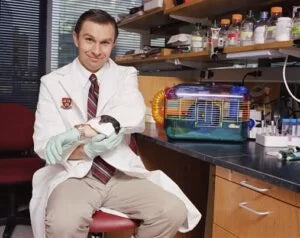Longevity Supplements David Sinclair Takes
Introduction
Dr. David Sinclair’s name got connected with longevity and healthy aging after his and his lab’s recent studies. One of their recent significant studies on aged mice showed how aging may be reversed through Yamanaka Factors successfully. Sinclair is also well-known for his book “Lifespan: Why We Age- And Why We Don’t Have To”.
Pioneering in longevity studies, Dr. Sinclair is often asked about the ways for activating longevity genes via supplements he takes. In addition to page 304 in his book, where Dr. Sinclair shares his supplements list, he had an interview with Andrew Huberman about his regimen and the food supplements he is taking daily.
The longevity supplements David Sinclair takes are the following
- Resveratrol- 1000 mg
- NAD+ (Nicotinamide Adenine Dinucleotide) boosters - 1000 mg
- TMG (Betaine or trimethylglycine)- 500 mg or 1000mg daily
- Metformin- 800 mg
- Aspirine- 85 mg
- Spermidine- 1000 mg a day
- Fisetin- 500 mg
- Coenzyme Q10
- Statin
- Vitamin D3
- Vitamin K2

What Are The Supplements David Sinclair Takes?
It is worth mentioning that Dr. Sinclair does not represent any longevity supplement provider. Yet, he mentioned several protocols he follows to complement his exercises and diet. Along with the one-time-meal-a-day principle Sinclair exercises in an amount of not gaining huge muscles but keeping his body flexible, active, and healthy.
So, let us talk about Sinclair’s best longevity supplements and their daily dosage.
Resveratrol

It has already been 15 years now that David starts his morning with Resveratrol mixed with a couple of spoonfuls of yogurt or olive oil. Resveratrol is hard to be absorbed by the body if it is taken with water only, so, mixing it with homemade greek yogurt David Sinclair’s Resveratrol gets better accepted by his body.
Protocol: Recently Dr. Sonclair switched yogurt with olive oil which contains oleic acid and is also a good activator of Sirtuins defenses. Thus, he dissolves 1000mg of Resveratrol in olive oil, adds some vinegar to it, and drinks it in the morning.
Resveratrol, David Sinclair believes, works well with NAD+ by activating Sirtuin genes and their epigenetic protection and DNA repair mechanisms. Resveratrol is an antioxidant that can be found in grape skin, red wine, plant roots, and tea.
As Sinclair’s joking, you might drink 200 glasses of red wine to get enough Resveratrol. Instead, you can take supplements without serious side effects.
That is the reason why Hello100 offers taking Trans-Resveratrol together with NAD. Trans-Resveratrol is believed to have anti-cancer, anti-inflammatory, cardioprotective, and neuroprotective effects on the human body.
NAD+ (Nicotinamide Adenine Dinucleotide)

Sirtuin genes that David and his colleagues study in their lab are NAD+-dependent enzymes. This means their protective and epigenetic activity is correlated to the NAD+ concentration in your cells. When the levels of NAD+ are low in your body the Sirtuins activity slowers. But as the levels decline while aging you might consider supplementing your cells with NAD+ precursors, a direct way to naturally produce the NAD+ molecule.
This is how Sinclair explains the cooperation between NAD+ and Resveratrol. “When you give too much Resveratrol to Sirtuins you are just accelerating the mechanism but if you don’t have enough fuel, the NAD+, you may not move”.
As NAD+ is a circadian molecule it is better activated in the morning and controls your inner clock. Taking your NAD+ boosters at night hours may disrupt your circadian rhythms while taking it early in the morning can increase NAD+ double-fold.
Protocol: David Sinclair takes NAD supplements for raising his NAD+ levels in just one step. Taking NAD+ precursors for several years he notices NAD+ levels increase in his blood. Yet, Dr. Sinclair mentions that you can also notice some significant changes in a few weeks. Dr. Sinclair and his 82-year-old father take 1000mg of NAD in the morning alongside Resveratrol. NAD+ raises insulin sensitivity, and energy levels and sharpens the mind.
Note that David Sinclair does not advise any best NAD+ supplement provider he uses. However, David Sinclair’s NAD+ booster dosage of 1000 mg might be high not only for beginners but also for long-time users. Higher than 600 mg a day may bring unwanted side effects. Therefore, it is recommended to stick with lower doses of NAD.
With the Hello100 Delayed Release NAD supplement, you get 500 mg of NAD daily. NAD precursors themselves are molecules with low bioavailability and are not well absorbed by the body. Hence, Hello100 added delayed release technology to the formula raising the bioavailability of the drug ensuring your body will receive the entire amount of NAD.
TMG Or Betaine

David Sinclair talked about taking TMG along with his NAD+ supplements. Taking TMG with NAD+ makes great sense for the following reason. When NAD+ precursors are taken into the body it uses up methyl molecules to convert into NAD+. Methyl molecules or methyl groups are vital for warding off DNA mutations. And when they are used by NAD+ production, their content decreases.
TMG (aka Betaine) obtained from beetroot, is a helpful methyl donor, meaning it gives away some of its methyl molecules to support DNA and also precursor conversion into NAD+.
Protocol: David Sinclair takes 500 mg of TMG with his NAD+ every morning. However, some people may notice side effects such as headaches, insomnia, or stomach discomfort with high doses of TMG. Thus, lower doses may safely enrich methyl groups.
Metformin

Another supplement David Sinclair takes is Metformin. This is a prescription drug in the USA that is given to people with Type 2 Diabetes (T2D) and is good for lowering blood sugar. “The Type 2 Diabetics taking Metformin, live longer than those who don’t have T2D. This means Metformin is a longevity drug”- this is what Dr. Sinclair believes.
Protocol: David takes Metformin at night and practices intermittent fasting each day. As he mentioned in his book earlier he takes 800mg of Metformin. But he may skip Metformin if he is going to exercise that day.
What Metformin does while you exercise is it reduces your stamina, so you do not gain giant muscles and do fewer repetitions. If you have stomach sensitivity or aim to gain huge muscles skip Metformin. But remember that muscles built up on Metformin are stronger and resistant to inflammations.
Metformin can be substituted with Berberine if you do not have a prescription. Berberine increases insulin sensitivity which is beneficial for your body. Also, it has better effects on your metabolism. But note that Berberine should be taken in big doses.
Statin

In his book “Lifespan” Dr. Sinclair talks about his family and his genes being “bad” including cases of strokes and cancer. The other thing is the cholesterol in the history of his family. These are the reasons why David Sinclair’s supplement list contains Statin.
Protocol: David Sinclair started taking Statin when he was 29 years old. Starting with “creamy blood”, with high cholesterol levels and a high risk of having heart stroke, he now measures his cardiovascular health and has a heart of a 20-year-old.
However, you should take into consideration that Statin may not be the perfect drug for everyone. Statin may have worse effects later in your life. Sinclair mentions PCSK9 inhibitor, an injection drug that is efficient for lowering cholesterol levels and hopes it to be a longevity drug.
Aspirin

People with cardiovascular disorders and a high risk of getting stroke are recommended to take Aspirin as prevention. It is believed that a low dose of Aspirin intake is good for anti-inflammatory, anti-heart attack, and, even possibly, anti-cancer effects. But the use of Aspirin must be prescribed by a doctor.
Protocol: In addition to Statin, which protects against stroke, Sinclair takes a daily dose of 85 mg of Aspirin.
However, you should be cautious about taking Aspirin in large doses as it may lead to bleeding. Hence, the prolongevity properties ascribed to Aspirin must go through further clinical studies.
Plants and Vegetables

Besides the taste of plants, Sinclair likes the idea of plants being rich in vitamins. Instead of taking multivitamins that are high in iron and might harm your body, plants nourish your body with pure nutrients.
The other factor is the presence of xenohormetic molecules in stressed plants. By stressed meaning, the plants that are slightly overripe, or even eaten by a caterpillar. This shows the plants and vegetables to be organic and fresh.
Protocol: David prefers eating dark-leaf spinach or spinach salad and does not shy away to choose the ones high in xenohormetic molecules.
Behaviors That Prolong The Lifespan

Going out to the external levels of longevity, we can discuss the role of exercise and physical activity, and how they affect Sirtuin activity and NAD+ levels. Sinclair in his podcast talks about SIRT1 and SIRT3 elevating while exercising. Thus, David SInclairs’ regimen aimed to maintain muscle endurance is crucial for several reasons.
One of them is the hormonal level, which refers to testosterone levels declining in the aging male body.
After measuring his blood test, Sinclair started taking serious steps toward his diet and exercise patterns. The incredible result was his biological age of 58 dropping down to 31 in a few months. He used to take ice baths, sleep on the cold side of his bed, and wear cool clothes even in winter trying to thermoregulate his body temperature.
In females, estrogen drops down with age and infertility is another issue arising. The study conducted on mice in Sinclair’s lab demonstrated infertility to be a “curable” issue solved by fasting (not extreme fasting) and lower caloric intake.
In addition, the female mice that supplemented their diet with NAD+ demonstrated astounding results of having their periods after menopause and even giving birth to offspring.
David avoids eating meat. But treats himself after working out. He also avoids at least one meal a day. He is walking every day, uses stairs instead of elevators, and attends a gym during the weekends. He is fond of the sauna before an ice-cold pool.
He does not smoke and avoids X-rays, CT scans, and UV exposures, and does not eat microwaved food. He quit eating sugar and sweets at the age of 40, though sometimes enjoys their taste.
